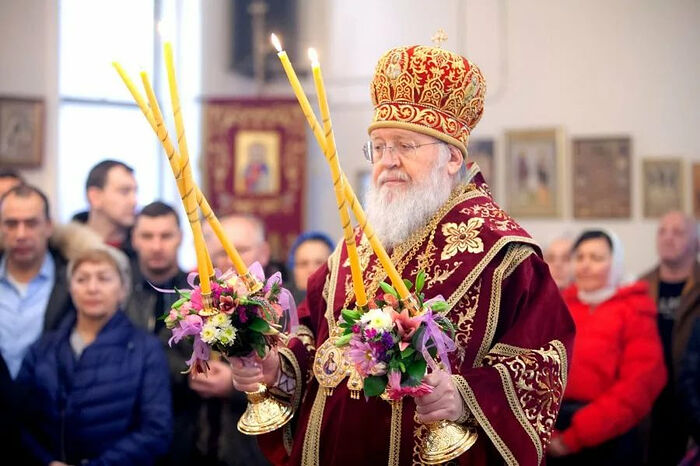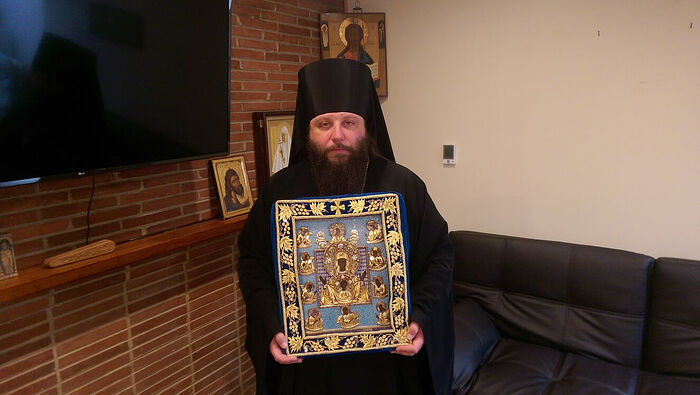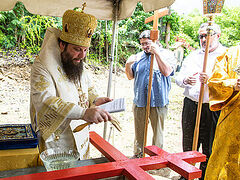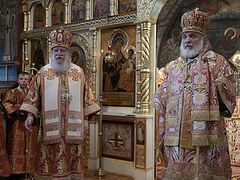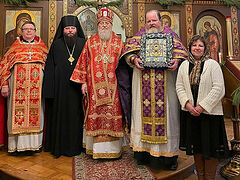Because of the pandemic, the Russian Church Abroad could not properly celebrate its 100th anniversary, but still hopes to hold one of the main events—a conference in Serbia where it was born a century ago. The First Hierarch of the Russian Orthodox Church Outside of Russia, His Eminence Metropolitan Hilarion of Eastern America and New York, and His Grace Bishop Nicholas of Manhattan discussed their plans.
—In mid-November, a Council of Bishops of the Russian Orthodox Church will convene in Moscow. How will ROCOR be represented?
Metropolitan Hilarion: First of all, I’d like to say that because of the coronavirus, which affected the entire world, including the USA and Russia, there has not been a final decision on the convening of a Council. At the present time, it is planned for the middle of November, and we hope that it takes place. As far as our representation, I think that the entire episcopacy of the Russian Church Abroad is preparing to participate in the Council. I also plan on attending.
—What matters do you think are most important for the Council to deliberate on?
—It is too early to discuss that; there is still plenty of time before the Council. But the Patriarch usually reports on the state of the Church at the present time, what has taken place in the Church since the last Council, and lays out plans for the future. In addition, it emphasizes the unity of the Church—both the part that lives in Russia and the part that lives abroad. For us it is very important that we sense ourselves in the bosom of the one Russian Church.
Bishop Nicholas: I’d like to add that the Russian Church Abroad planned to hold its own Council of Bishops in June of 2020; but, again, because of the pandemic, it was postponed. We still can’t say when it will be held, but we hope next year.
—What do you think about the idea of having another Council—a Pan-Orthodox Council with the participation of all Local Churches?
Metropolitan Hilarion: Of course, that’s a good idea, but the difficulty is the position of the Greek Orthodox Church under the authority of the Patriarchate of Constantinople. They have their own conception of what Orthodox unity means. They think that we should also subject ourselves to them, and that is a big problem for the Local Churches. I would say that the Constantinople Patriarchate meddles in the affairs of others. They are trying to create a sort of “Orthodox papacy,” so that everyone submits to the Ecumenical Patriarch.
Bishop Nicholas: Constantinople considers itself the leader of all jurisdictions. But Orthodoxy is first and foremost conciliarity, which must be preserved.
—Because of the coronavirus pandemic, the Russian Church Abroad could not celebrate its centennial either last year or this year. What plans remain in place?
Metropolitan Hilarion: We expect to hold our jubilee conference in Serbia, where our Church was founded one hundred years ago. But because of the pandemic the plans are not finalized, and apparently not everyone can participate in this gathering.
Bishop Nicholas: At the present time this conference is planned for the end of November. Those of us in the USA cannot fly to Serbia because of scheduling conflicts and other reasons. As far as I know, the leadership of ROCOR will be represented by His Eminence Metropolitan Mark of Germany.
—How is the Church handling the pandemic now?
Metropolitan Hilarion: In my opinion the pandemic did not affect Church life very much as such. Still, it did affect our flock. At first people could not attend church, but thank God now everything is changing. Vladyka Nicholas, what do you think?
Bishop Nicholas: In our Eastern American Diocese we tried to be very careful from the very start of the pandemic. In many parishes the number of people allowed to attend services was limited. Sometimes it was one or two people, maybe ten. But priests continued to perform divine services, sometimes they were aided only by a reader or choir singer. Thanks to this, prayers in our churches and chapels continued throughout Great Lent, Holy Week, and on Pascha until the authorities began to soften restrictions.
—Another consequence of the pandemic is that the Kursk Root Icon of the Mother of God "Of the Sign" could not visit Russia for the first time in ten years. Can the faithful hope that it will visit next year?
Bishop Nicholas: If the Lord blesses, yes. All the previous years the Kursk Icon visited Russia in September-October, on the feast day of the Nativity of the Most-Holy Mother of God. Usually, we would spend about a week in the Kursk Diocese and then visit one other diocese.
—When can we expect a decision on the scheduling of the next trip?
—In December the Synod of Bishops of ROCOR will convene, and we will discuss possible plans for the Kursk Icon. Without a doubt, a visit to Russia in September-October of next year will be raised for consideration. We can come to an agreement and try to plan it more specifically. Everything will depend on how the situation develops and on God’s blessing. We will see how it turns out.
—Many people in the Church fear vaccination. What do you advise your spiritual children when they ask you?
Metropolitan Hilarion: Vaccination is not a new thing, it has existed for a long time, so people should not fear it. For instance, I was vaccinated as were many others. But some are very alarmed by this. In this case the Church makes no recommendations: We do not advise people to be vaccinated, nor do we advise them to reject vaccination. This is the free choice of every person.
Bishop Nicholas: We merely call upon people to pray, and the Lord will help them, whatever they do.

